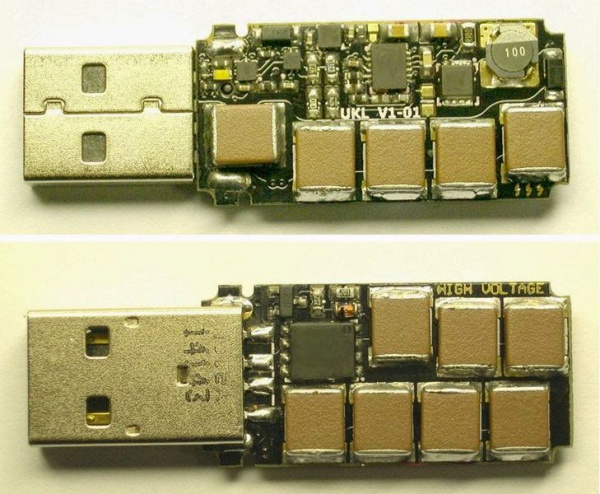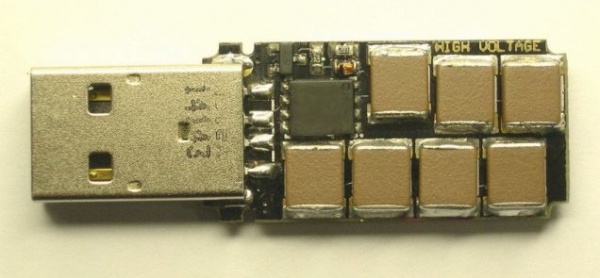Don’t trust other people’s USB flash drives, they could fry your laptop

‘USB Killer’ is a flash drive designed to fry your laptop.
Have you ever heard stories about malicious USB thumb drives frying laptops and thought they were far fetched? If you’re a mischief-maker of a certain age, you’ll remember the idea of the floppy disk bomb, a specially engineered floppy disk that would supposedly melt inside an enemy’s drive.Security experts have been warning for years about the dangers of USB sticks as a conduit for malware, but a Russian researcher has bragged about coming up with a more direct method for borking a computer – with old-fashioned electricity. The idea is cunningly simple but fiendish, and reminds us of the Etherkiller: the researcher, nicknamed Dark Purple, broke up a standard USB stick, and installed an inverting DC-DC converter and some capacitors bought from a Chinese website.
The “USB Killer” device was created by a do-it-yourself hardware enthusiast who described his project, complete with pictures and technical details, on a Russian blogging platform in February. Perhaps unsurprisingly, though, the National Security Agency’s creations are just the tip of the iceberg when it comes to dongles with nefarious programming. An article about the bomb-drive—first posted on the Russian website Habrahabr by its designer, and then translated into English on Kukuruku Hub—describes its design and intended effect, fortunately without going into the details of how to make one.
Home → Android → Don't trust other people's USB flash drives, they could fry your laptop
Don’t trust other people’s USB flash drives, they could fry your laptop
13 Mar 2015 | Author: dima | No comments yet »
‘USB Killer’ is a flash drive designed to fry your laptop.
Have you ever heard stories about malicious USB thumb drives frying laptops and thought they were far fetched? If you’re a mischief-maker of a certain age, you’ll remember the idea of the floppy disk bomb, a specially engineered floppy disk that would supposedly melt inside an enemy’s drive.Security experts have been warning for years about the dangers of USB sticks as a conduit for malware, but a Russian researcher has bragged about coming up with a more direct method for borking a computer – with old-fashioned electricity. The idea is cunningly simple but fiendish, and reminds us of the Etherkiller: the researcher, nicknamed Dark Purple, broke up a standard USB stick, and installed an inverting DC-DC converter and some capacitors bought from a Chinese website.
The “USB Killer” device was created by a do-it-yourself hardware enthusiast who described his project, complete with pictures and technical details, on a Russian blogging platform in February. Perhaps unsurprisingly, though, the National Security Agency’s creations are just the tip of the iceberg when it comes to dongles with nefarious programming. An article about the bomb-drive—first posted on the Russian website Habrahabr by its designer, and then translated into English on Kukuruku Hub—describes its design and intended effect, fortunately without going into the details of how to make one.

Thinking that the USB would have some essential data this thief inserted the USB flash in his laptop and within a matter of few minutes half laptop was totally burnt down. The idea, roughly, is to fill a standard-looking USB case with hardware that will pulse a high-voltage charge into a USB port and just fry everything nearby. This continues until the capacitors are down to -7V, at which point the DC-DC converter is switched back on, and begins to charge the capacitor . for the next cycle. The dongle, which the anonymous engineer has disguised as a thumb drive, cleverly circumvents the self-preservation mechanisms of USB ports by using a power converter and transistor.
